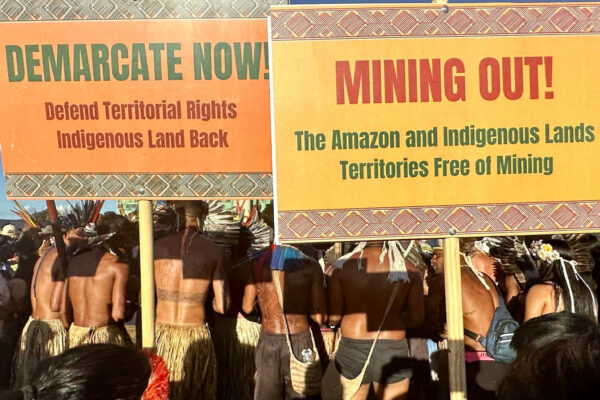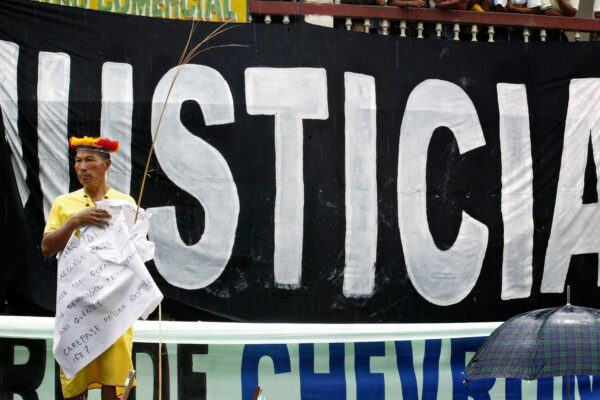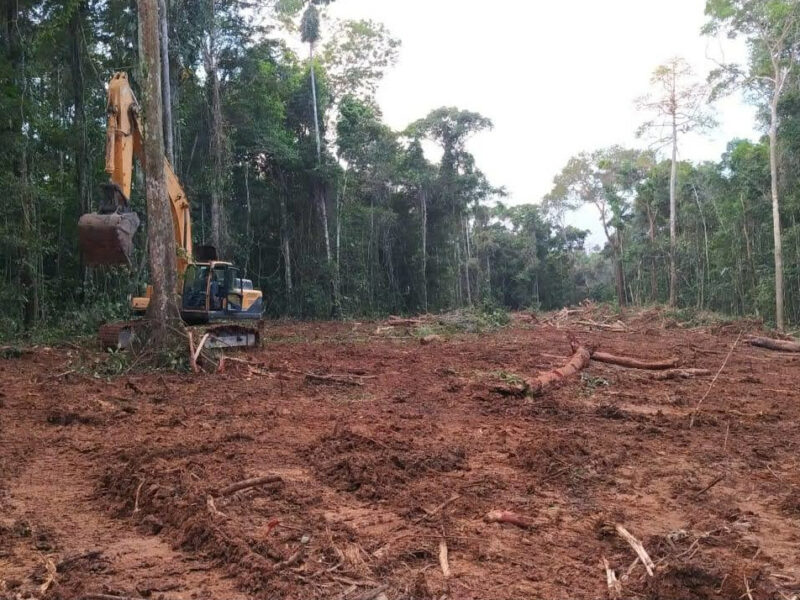Añangu, Ecuador – Standing before the United Nations General Assembly in 2007, Ecuadorean President Rafael Correa offered the international community a way to make a significant impact on climate change: Donate $3.6 billion to the economy of Ecuador by 2019, and the country would refrain from drilling for oil in its Yasuní National Park, one of the most biologically diverse tracts of Amazon rainforest. The initiative would prevent the total release of about 400 million tons of carbon dioxide into the atmosphere – the equivalent of France’s output in one year.
The international community was not quick to seize the opportunity, which was embraced by some, and likened to extortion by others. By August 2013, halfway to the 12-year deadline, the UN-administered fund had collected just $13 million – less than 1 percent of the goal. President Correa scrapped the initiative and announced that the state-run oil company Petroamazonas would begin developing oil fields in the Yasuní.
The decision drew criticism from environmentalists around the world, who had celebrated Correa’s original initiative and even coined the term “Yasunization” to describe similar preservation movements in other oil-rich countries like Nigeria and Norway. In Ecuador, his move has drawn the ire of environmental and indigenous rights groups and sparked a debate over an otherwise extremely popular administration. One organization, Yasunidos, is trying to collect 600,000 signatures by April to force a national referendum on whether to allow drilling.
But in a country where nearly one-third of the population lives below the poverty line, the dilemma is clear. The Yasuní-ITT block, named for the Ishpingo, Tambococha, and Tiputini oil fields, holds about 20 percent of Ecuador’s known reserves. Correa says Ecuador now stands to earn $18 billion ($11 billion more than initial estimates) by drilling. Calling it one of the most difficult decisions of his administration, he said he had done all he could. The international community failed to take him up on his deal and his country – particularly the Amazon region, where the poverty rate is almost double the national level and unemployment and malnutrition are high – needs the money to fight poverty and illness.
“Ecuador ama la vida”
Oil development in Ecuador has been a contentious subject in recent years. American oil company Chevron is the object of national contempt because of lasting contamination from drilling by Texaco here during the 1960s, 70s, and 80s (Chevron bought Texaco in 2000). In 2011, Chevron was slapped with a record $18 billion fine for environmental and social harms caused by development in Lago Agrio, just northwest of Yasuní.
Correa vehemently supports the plaintiffs in the Chevron case and promotes the eco-friendly national slogan “Ecuador ama la vida” – “Ecuador loves life.” New municipal signs encouraging citizens to protect their country’s land, wildlife, and fresh waters dot the highways here. Correa insists that today’s technology allows oil drilling to be less destructive than before, and has repeatedly said that only 1 percent of Yasuní’s land will be affected.
But a 2009 study by the Wildlife Conservation Society shows that infrastructure built to transport oil through the Yasuní from other areas has already had an affect on the ecosystem and the indigenous communities living there. Matt Finer, a research specialist at the Amazon Conservation Association who investigates how oil and gas development affect the rainforest, says that “the development plans we have seen for ITT indicate that Ecuador is planning to drill deep into what is now one of the most remote and intact sections” of the Yasuní. According to Mr. Finer, new oil roads “have the potential to truly devastate the park.”
At the center of the debate
The Yasuní’s indigenous peoples, who inhabited the land for centuries before missionaries, oilmen, and ecotourists started to make their way in, are not united in the debate over their ancestral land’s resources. A small number of “uncontacted peoples” live in voluntary isolation from the outside world, while other communities work with the oil companies and rainforest tourists.
Many communities have effectively negotiated with oil companies through the years for benefits and compensation, says Veronica Davidov, an anthropology professor at New Jersey’s Monmouth University, who has done extensive research on ecotourism and oil extraction in the Ecuadorean Amazon. Ironically, the compensation from oil companies has even helped support some ecotourism projects here.
Dr. Davidov says the indigenous communities she has interviewed in the area were cynical about Correa’s initiative from the beginning. Many “assumed that Correa would eventually drill anyway…. There is a lot of skepticism among the indigenous communities about how green or environmentally committed he actually is.”
This week, British newspaper The Guardian published a document it obtained from talks between China and Ecuador in 2009, which appeared to show that Correa’s government was considering making a deal with China to drill for oil in the Yasuni-ITT block during the time the area was ostensibly protected by the initiative. The Ecuadorean government responded swiftly to the report, and the document was removed from The Guardian‘s website within a day. Ecuador’s coordinating minister of economic policy, Patricio Rivera Yánez, stated in a letter to The Guardian that the document had been manipulated; the proposal to include the ITT block in negotiations was made by China and was “never an object of negotiation on Ecuador’s part.”
“A false dilemma?”
Correa’s government enjoys widespread support in Ecuador. According to a 2013 survey by Chilean NGO Latinobarómetro, 73 percent of Ecuadoreans approve of Correa’s government and 77 percent feel the country is progressing. Correa says that environmental activists are presenting a “false dilemma.”
“‘Yasuní or oil’: this is not true…. I will never allow the Yasuní to disappear,” Correa said in the speech last August announcing the cancellation of the preservation initiative.
Joan Martinez Alier, an economist from the Autonomous University of Barcelona and a founding member of the International Society for Ecological Economics, says he wasn’t surprised to hear Correa reverse the initiative. Correa’s bottom line is to develop the economy, Mr. Alier says – whatever the consequences are for the Yasuní.
“Correa is changing the image of Ecuador by sacrificing the Yasuní ITT and with other decisions favorable to large scale open cast mining,” says Alier.
“President Correa is an economist, he is not an environmentalist.”













